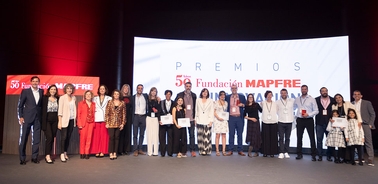Fundación MAPFRE awards three major international social innovation projects

Antonio Huertas: “Technology and innovation must have a humanistic purpose and help reduce inequality.”
PEGASI (Chile), a solution that uses artificial intelligence to improve early cancer detection and optimize care coordination between patients, hospitals, and healthcare professionals; Helpful Village (United States), a platform that manages the aging-in-place model and makes it easy to request help 24/7, automates processes, and offers video calls, interactive maps, and geolocation of volunteers; and Cocoon (Sweden), an airbag for children's bicycle seats that deploys in 20 milliseconds when its AI detects a risk of collision.
These are the winners of the 8th Edition of the Fundación MAPFRE Awards for Social Innovation, an initiative that seeks to improve lives through socially impactful entrepreneurial projects. Promoted in collaboration with IE University, the awards' academic partner, this platform celebrates teams that turn innovative ideas into real solutions with high social value.
The three winners each received €40,000 to continue developing their solutions, along with an IE University a mentoring program. They will also become part of Red Innova, which promotes the exchange of expert knowledge and contributes to the social innovation ecosystem.
The event, held at the Reina Sofía Museum in Madrid, was attended by Juan Cruz Cigudosa, Spain’s Secretary of State for Science, Innovation and Universities; Antonio Huertas, President of Fundación MAPFRE; Diego del Alcázar Benjumea, CEO of IE University; and Andrés Allamand, Secretary General of the Ibero-American General Secretariat.
Social and inclusive projects
Antonio Huertas, president of Fundación MAPFRE, congratulated the 12 finalists and praised the 350 innovative projects from around the world that were submitted to this edition of the awards, all of which share the common goal of improving the lives of others. He also highlighted that thousands of disruptive and inspiring proposals have already been submitted for these awards, many of which have now become a reality that help hundreds of thousands of people.
The three winners: Chile, Sweden, and the United States
Luis Santiago, co-founder and CEO of PEGASI SAIL: "PEGASI SAIL was born out of a painful personal experience, but it has become a tool with a real impact on thousands of patients. Thanks to AI, we are transforming the way cancer is diagnosed and treated, optimizing the time that sometimes means the difference between life and death. This award reinforces our commitment to continue developing solutions that break down barriers, integrate healthcare systems, and bring hope to those who need it most.“
Manuel Acevedo, founder and CEO of Helpful Village: ”Older people deserve the right to age at home, surrounded by their community, with independence, dignity, and real support. Seeing how my mother, after retiring, faced loneliness and a lack of purpose led us to discover the Village Movement in the United States and to understand that many communities needed tools to better organize their mutual aid. That was all we needed to create Helpful Village."
Emma Garatea, founder and CEO of Cocoon: “This award reinforces the idea that sustainable mobility must also be safe, especially for children. At Cocoon, we don't just design an airbag, we design peace of mind for parents who want to ride their bikes without fear. This gives us the strength to continue growing, learning, and contributing to greener, but also more humane cities.”
Three hundred and fifty entrepreneurs from different countries
This year's call for entries attracted 350 projects developed by scientists, researchers, university students, and business school students. The 12 finalists presented their proposals to a jury of professionals from the business and social entrepreneurship fields, who selected the three winners based on criteria such as their potential social impact, technical and economic viability, and the team's capacity and experience.